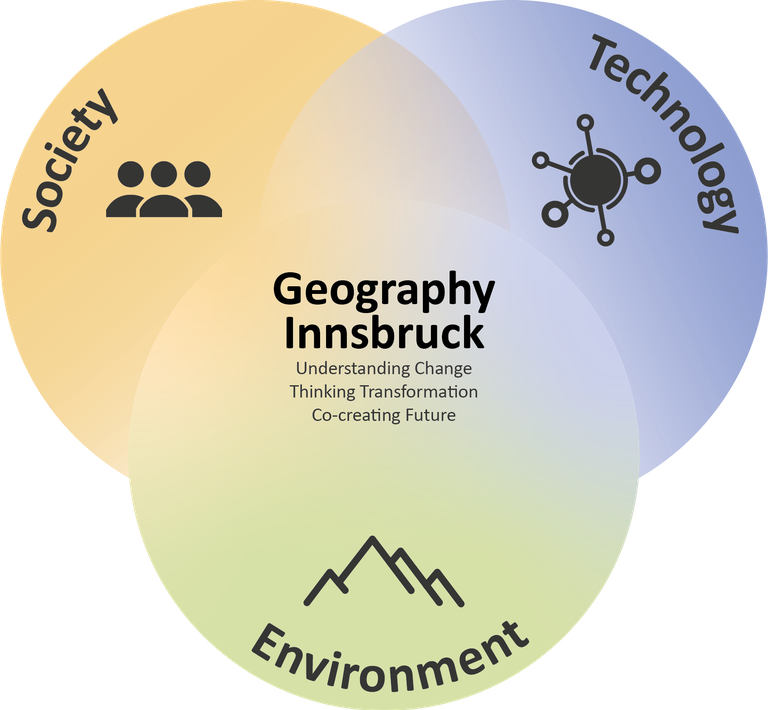Research focus
Understanding change - thinking transformation - co-creating future
At the Department of Geography our key interest is in society-technology-environment relationships, transformation processes in the Anthropocene, and sustainability. Through(inter-)disciplinary basic research in these areas we create systems knowledge and through applied research as well as transdisciplinary research processes we produce transformation knowledge. Recognizing the significant influences of digitalization on all areas of the society-technology-environment system considering ecological, social, political, economic and cultural changes and on all aspects of sustainability, we account for the active role of (digital) technologies as objects of research and their critically reflected use as research tools.
Our research questions are addressed by using a variety of social and natural science methods. In particular, we develop new scientific approaches in the fields of geoinformatics, remote sensing, process modeling, qualitative, mobile, digital and participatory research . The regional focus comprises urban spaces (especially in Central Europe, Asia and Latin America) and mountain regions (especially the Alps and the Andes).
The specific research activities are summarized in the following foci , which comprise the activities of all research groups at the department:
Climate change
...and its consequences affect almost all areas of the society-technology-environment system. Using different methods of earth observation, we detect climate change-related changes on different space and time scales. By developing and using environmental models, future developments in the society-technology-environment system are estimated, thus contributing to the development of sustainable action strategies.
Working groups:
Digitalization
...now permeates almost all areas of the society-technology-environment system. The pathways of digitalization in the coming years and decades will have a significant impact on climate change and sustainability, as well as on the human-machine relationship and thus the future of humanity. Among other things, the research groups at the department investigate the inscription of technologies in cognition, bodies and related spatializations and politics, the role of technologies in the (re)production of social inequalities, the effects of digitalization on urban development, migration and everyday mobilities, as well as on the human-nature relationship.
Working groups:
- Body Politics, Digitalisation and Space
- Education and Communication for Sustainable Development
- Geoinformatics
- Transient Spaces & Societies (Digitalisierung, Urbanisierung, Mobilitäten)
Earth Observation
...is the recording and analysis of phenomena of the physical and anthropogenic environment by means of in-situ measurements and remote sensing techniques. Methods developed and applied at the department comprise for automated mapping and analysis of spatio-temporal data creating new possibilities of interpretation of Earth surface processes, process interactions and their effects on the different geographical scales in the society-technology-environment system.
Working groups:
Geoinformatics
...includes all computer science applications that deal with geographic, i.e. spatial data. This includes geographic information systems (GIS), digital cartographies, geostatistics, and the analysis of earth observation data (for example from remote sensing, digital image processing, methods of geodesy such as surveying and global navigation satellite systems).
Working groups:
Inequalities
... in societies, such as socio-ecological, economic, digital or cultural, can be observed and analyzed across all scales from global to local. The underlying processes and (power) structures and possible intersectionalities are analysed by some of our research groups. At the same time, social transformation processes are examined as possible responses to inequalities.
Working groups:
Ressources
... in our understanding include natural and human-made, material and immaterial ressources as well as the associated discursive attributions of meaning. Essential aspects are the emergence and potentials of ressources, their use and shortages, the rights of disposal, resource conflicts and associated transitions in space and time.
Working groups:
Risks
...arise at the intersection of society, technology, and the environment. An integrated view of human, geo-, and bio-physical systems enables a better understanding of different aspects of risks as they arise in the context of natural hazards and the impacts of climate change. This further includes the analysis of risk drivers, resilience and the societal management of risks.
Working groups:
Sustainability
... is a holistic principle that describes a dynamic state of equilibrium of the Earth system that seeks a permanent safeguarding of ecological carrying capacity, social justice, cultural diversity and economic performance in indivisible interaction. In this sense, research on sustainable development aims to develop a sustainable social contract for the 21st century that guarantees desirable quality of life for all people within ecological limits.
Working groups:

